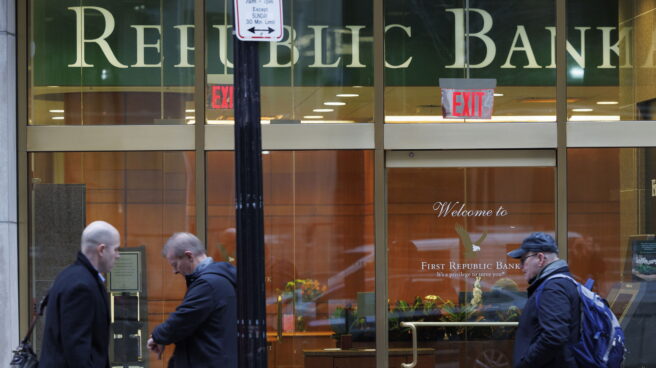

Pedestrians walk past a branch of First Republic Bank in Boston, Massachusetts.
Bank of the First Republic (FRB) returned to the “red numbers” on the New York Stock Exchange, and its namesThey fell almost 31.5% in the middle of the session.to $23.50 (€22), despite major US banks were known to be in talks to bail it out.
Having learned that large banks will invest in an enterprise whose liquidity and solvency are doubtful, its listed securities rose by 10% before the closing of the site and remained about $34.20 (€32). Wall Street itself also closed positive yesterday.
Its leading indicator, the Dow Jones, rose 1.17% and the S&P 500 closed 1.76%. Now the Dow Jones has turned red and is down 1.23% and the S&P 500 is down 1.05%. Thus, the bailout was not enough to calm the markets.
Rescue of the First Republican Bank
Eleven US banks, including the four largest (Bank of America, Citigroup, JPMorgan Chase and Wells Fargo), announced yesterday total infusion of $30,000 million (approximately 28,180 million euros) in the Bank of the First Republic in order to strengthen its liquidity and avoid its collapse.
The $30 billion injection “reflects their confidence in the country’s banking system and helps ensure the First Republic has enough liquidity to continue serving its clients,” according to a statement from the four largest banks. Four also noted that regional, medium and small banks are essential for the health and functioning of the financial system.
Specifically, Bank of America, Citigroup, JPMorgan Chase and Wells Fargo will place $5,000 million (about €4,683 million) in uninsured deposits with the FRB.
For their part, Goldman Sachs and Morgan Stanley will each contribute $2,500 million (€2,341 million) to the FRB, while BNY Mellon, PNC Bank, State Street, Truist and US Bank will make deposits of $1,000 million. (937 million euros). Euro).
The injection of a large bank into the FRB comes after rating agencies S&P Global Ratings and Fitch downgraded First Republic Bank’s credit rating to the category of “junk bonds” due to the outflow of deposits from the organization and even after the US. regulators have promised to support the banking sector after the collapse of Silicon Valley Bank (SVB).
Punishment of bankers who bankrupt their legal entity
President of the United States Joe Biden asked Congress to expand the powers of regulators and the government should hold the top executives of the bank accountable if the institution fails, especially when there has been mismanagement, the White House announced on Friday.
According to the President, “Congress can and should do more to hold top bankers accountable” and steps should be taken to strengthen the capacity of the federal government hold senior management accountable in the event of bank failures and their arrest by the Federal Deposit Insurance Corporation (FDIC).
“When banks fail due to mismanagement and excessive risk taking, it should be easier for regulators to seek compensation from executives, impose civil sanctions and ban executives from ever working in the banking industry again,” he said.
Source: El Independiente